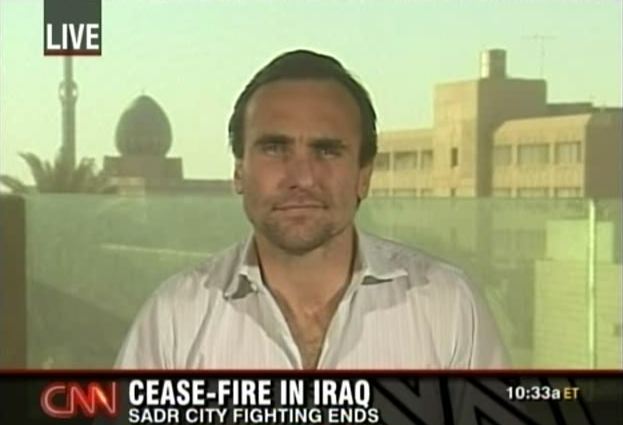NR: "...something of a victory for Muqtada."

Length: 2:19
LARGE (27.0 MB) ----- SMALL (2.8 MB)
Michael is back in Baghdad, and reports this morning on the latest ceasefire declaration from Muqtada al-Sadr. Although it was touted as a win for Prime Minister Maliki, the real winner is Muqtada -- who has not been forced to disband his militia (thereby keeping his power base) and is positioned to make serious political inroads for the October elections -- and, of course, Iran.
TJ HOLMES: Well, time to shift the focus to another story developing in the Middle East. This morning, the Iraqi government is confirming a cease-fire between the troops and militia fighters loyal to anti-American cleric Muqtada al-Sadr. For weeks, they've been battling in Baghdad's Sadr City.
And CNN's Michael Ware is in the Iraqi capital with the latest for us.
Michael, thank you for being here. Good to see you.
Al-Sadr has maybe a job on his hands. As powerful as he may be, you know, this Mehdi army of his, not everybody in that Mehdi army is still operating as one cohesive unit under his command. Some of them have branched out.
How can he really rein them in now?
MICHAEL WARE, CNN CORRESPONDENT: Well, T.J., this is going to be a great question. I mean, as you say, we've seen more than six weeks of fighting in and around Sadr City, which is part of the capital of about two million people. And in this fighting between U.S. and Iraqi forces and the Mehdi army militia of Muqtada al-Sadr, hundreds and hundreds of people have died.
So what we now have is statements from the government spokesman and from the Mehdi army spokesman saying that an agreement is in place. And it's now hoped that a cease-fire will take effect sometime tonight or tomorrow morning, Sunday, local time.
Now, one of the things that we've seen during this conflict over these six weeks or so is that the various branches of Muqtada's militia, which as you say had been fracturing and breaking up, had been infiltrated by rogue criminal groups at the lower level, and whose hard liners had been cleaved aside and recruited by Iran and sent back to Iraq to attack mainly U.S. forces, have all come together. So the main body which has remained loyal to Muqtada throughout has since been receiving assistance from these other elements, particularly the Special Groups trained by Iran. And we saw them blend and fuse as one.
This may have helped consolidate some of the Iranian power, it may not. But certainly this, in many ways, might be viewed as something of a victory for Muqtada because his militia does not have to disband -- T.J.
HOLMES: Does not have to disband. We're not sure if they will disarm. But you're right, a tricky situation as always there in Baghdad.
Michael Ware, we always appreciate the updates from you. We'll be checking in with you again later. Thanks so much.
